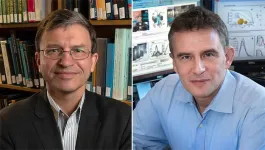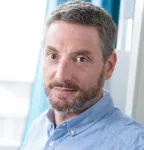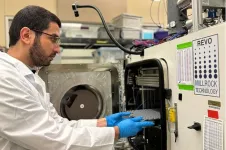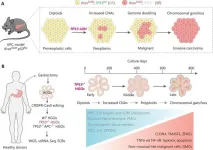(Press-News.org) UPTON, N.Y. — The American Association for the Advancement of Science (AAAS) has recognized two staff scientists from the U.S. Department of Energy’s (DOE) Brookhaven National Laboratory with the distinction of Fellow: Deputy Associate Laboratory Director for High Energy Physics Dmitri Denisov and Senior Chemist Anatoly Frenkel. Each year, AAAS bestows this honor on select members whose “efforts on behalf of the advancement of science, or its applications, are scientifically or socially distinguished.” Marking the 150th anniversary of the program, new fellows will be honored at a forum on September 21, 2024, at the National Building Museum in Washington, D.C.
AAAS is the world’s largest general scientific society and publisher of the Science family of journals. The tradition of naming Fellows stretches back to 1874. AAAS Fellows are a distinguished cadre of scientists, engineers, and innovators who have been recognized for their achievements across disciplines ranging from research, teaching, and technology, to administration in academia, industry, and government, to excellence in communicating and interpreting science to the public. Denisov and Frenkel are two of 502 scientists, engineers, and innovators spanning 24 scientific disciplines who are being recognized as members of the 2023 class of AAAS Fellows.
Dmitri Denisov
Denisov has been a long-time leader in particle physics, a field in which experiments often run for decades and a discovery can rewrite an entire science program — and therefore, it can be challenging to plan ahead. Denisov’s strategic guidance and many advisory roles have significantly shaped the future of particle physics in the U.S. and around the world.
He was recognized by AAAS for “distinguished contributions to particle physics through experiments at high energy colliders, and for guidance of the field through numerous management and advisory roles.”
“Research in particle physics advances our understanding of the universe at every level, from its smallest particles like quarks and leptons to its largest objects like galaxies,” Denisov said. “My experience leading institutions and experiments that help uncover these mysteries has been deeply rewarding. In addition to developing the unique facilities, accelerators, detectors, and computational techniques that enable this research, I’ve had the pleasure to collaborate with many international partners — and those team efforts are a critical component of the field’s success. I am flattered to be recognized with AAAS fellowship and looking forward to continuing my contributions to the particle physics community and AAAS.”
Currently overseeing Brookhaven’s world-leading high energy physics program as a deputy associate laboratory director, Denisov is responsible for the Lab’s strategic plan for exploring the universe at its smallest and largest scales. Central to the program is close cooperation with other U.S. laboratories, the international particle physics community, and funding agencies. By balancing those complex collaborations with available funding and international priorities set forth by the High Energy Physics Advisory Panel’s P5 report, Denisov ensures Brookhaven contributes its expertise and cutting-edge capabilities to the world’s most pressing particle physics questions in the most valuable ways.
Under Denisov’s leadership, Brookhaven Lab continues the important role as the U.S. host laboratory for the ATLAS experiment at CERN’s Large Hadron Collider (LHC), the world’s highest energy particle accelerator. The Lab participates in many areas of the ATLAS experiment, such as construction, project management, data storage and distribution, and experiment operations. Brookhaven is leading the U.S. contribution to a major upgrade to the ATLAS detector and construction of superconducting magnets in preparation for the LHC’s high-luminosity upgrade.
Denisov also oversees Brookhaven’s important roles in the upcoming Deep Underground Neutrino Experiment (DUNE) based at DOE’s Fermi National Accelerator Laboratory (Fermilab) and the Sanford Underground Research Facility, from design and construction to operations and analyses. DUNE scientists will search for new subatomic phenomena that could transform our understanding of neutrinos.
Denisov provides crucial support for other international experiments that the Lab’s high energy physics program actively participates in. These include the Belle II experiment at Japan’s SuperKEKB particle collider, for which Brookhaven provides critical computing and software, and the Rubin Observatory that is currently under construction in Chile. Once the Rubin Observatory begins capturing the data from the cosmos, physicists in Brookhaven’s high energy program will take on roles involving operations, scientific analysis, and computing.
At home at Brookhaven, Denisov oversees the Physics Department's contributions toward a new collaborative effort between DOE and NASA that aims to land and operate a radio telescope on the lunar far side. Called LuSEE-Night, the project marks the first step towards exploring the Dark Ages of the universe, an early era of cosmological history that’s never been observed before. LuSEE-Night’s goal is to access lingering radio waves from the Dark Ages — a period starting about 380,000 years after the Big Bang — by operating in the unique environment of radio silence that the lunar far side offers.
All the while, scientists in the Lab’s high energy physics program under Denisov’s leadership are regularly pioneering new detector technologies, software, and computing solutions that could be used for future particle physics facilities and experiments — and other scientific efforts beyond the field of high energy physics.
“We are thrilled by Dmitri’s distinct recognition by the AAAS Fellowship and look forward to his continuing leadership of Brookhaven’s high energy physics program in the coming years following the 2023 P5 recommendations,” said Haiyan Gao, Brookhaven Lab’s associate laboratory director for nuclear and particle physics.
Before arriving at Brookhaven Lab, Denisov contributed 25 years to the high energy physics program at Fermilab. There, he was most prominently known for serving as the spokesperson for the DZero experiment, which used Fermilab’s Tevatron collider to study the interactions of protons and antiprotons. Denisov led the collaboration of scientists from 24 countries and oversaw publication of over 300 scientific papers written by the collaboration. Strong contributions from Brookhaven’s DZero group were critical for the success of the experiment.
Denisov earned his master’s degree in physics and engineering from the Moscow Institute of Physics and Technology in 1984 and a Ph.D. in particle physics from the Institute for High Energy Physics in Protvino in 1991. Before joining Fermilab in 1994, he was a staff scientist at the Institute for High Energy Physics and the SSC Laboratory.
Anatoly Frenkel
Anatoly Frenkel is a senior chemist in the Structure and Dynamics of Applied Nanomaterials group of Brookhaven Lab’s Chemistry Division and a professor in the Department of Materials Science and Chemical Engineering at Stony Brook University (SBU). He is also an affiliated faculty member in SBU’s Department of Chemistry and Institute for Advanced Computational Science.
He was recognized by AAAS for “distinguished contributions to the development and applications of in situ and operando synchrotron methods to solve a wide range of problems in chemistry and materials science.”
“It is an honor to have been nominated and elected to be an AAAS fellow,” Frenkel said. “This recognition reflects on more than two decades of work, going back to the time we first learned how to analyze nanostructures, then properties, and, finally, mechanisms in different types of functional nanomaterials.”
Frenkel’s research focuses on understanding the physicochemical properties of nanocatalysts — materials with features on the scale of billionths of a meter that can speed up or lower the energy requirements of chemical reactions. He’s particularly interested in understanding how materials’ physical structure and other properties relate to their functional performance, the mechanisms of catalytic reactions, and the mechanisms of work in electromechanical materials. He is a long-time user of the National Synchrotron Light Source II (NSLS-II), a DOE Office of Science user facility at Brookhaven Lab that produces bright beams of X-rays and other forms of light that scientists use to learn about material properties.
Over the course of his career, Frenkel has developed new approaches for studying materials while they are operating under real-world conditions — known as in situ/operando research. In this work, he uses synchrotron techniques, such as X-ray absorption spectroscopy (XAS), X-ray imaging, and X-ray diffraction — all at NSLS-II — as well as advanced electron microscopy techniques at Brookhaven Lab’s Center for Functional Nanomaterials (CFN), another DOE Office of Science user facility. These studies provide detailed insight into materials’ performance and may guide the design of new materials with improved functionality for a wide range of applications. Frenkel has also advanced the use of machine learning and other forms of artificial intelligence to discover important material properties purely from their experimental X-ray signatures. Recent examples include studies to understand how catalysts change as they operate under harsh conditions and to discover ones that could potentially convert carbon dioxide (CO2) into useful products.
“Anatoly’s work to probe how catalysts convert waste products, such as the greenhouse gas CO2, into useful products is important to our efforts in clean energy research at Brookhaven, and it is well deserving of this award,” said John Gordon, chair of the Chemistry Division at Brookhaven Lab.
“Anatoly has been a valued member of our faculty,” said Dilip Gersappe, Stony Brook University Materials Science and Chemical Engineering department chair. “We are thrilled that his pioneering work in developing multi-modal methods for nanomaterial characterization, and the use of novel approaches to identifying spectroscopic signatures through machine learning, has been recognized by this honor.”
Frenkel earned a master’s degree in physics from St. Petersburg University in Russia in 1987 and his Ph.D. from Tel Aviv University in Israel in 1995. He pursued postdoctoral research at the University of Washington, Seattle, and then joined the University of Illinois at Urbana-Champaign as a research scientist from 1996 to 2001. He served on the faculty of Yeshiva University as a Physics Department chair from 2001 to 2016 and was a visiting scientist (sabbatical appointment) at Brookhaven Lab in 2009. He’s been a joint appointee at Brookhaven and Stony Brook University since 2016.
At Brookhaven, Frenkel has served as spokesperson and co-director of the Synchrotron Catalysis Consortium since 2004, and he’s arranged a series of courses on X-ray absorption spectroscopy held at Brookhaven Lab continuously since 2005 and at various institutions around the world. He is a fellow of the American Physical Society (2017) and has held a series of visiting professor fellowships at the Weizmann Institute of Science in Israel.
Brookhaven National Laboratory is supported by the Office of Science of the U.S. Department of Energy. The Office of Science is the single largest supporter of basic research in the physical sciences in the United States and is working to address some of the most pressing challenges of our time. For more information, visit science.energy.gov.
Follow @BrookhavenLab on social media. Find us on Instagram, LinkedIn, Twitter, and Facebook.
END
Two Brookhaven lab scientists named AAAS Fellows
Honor recognizes distinguished contributions to particle physics, chemistry, and materials science
2024-05-07
ELSE PRESS RELEASES FROM THIS DATE:
Chimps learn and improve tool-using skills even as adults
2024-05-07
Chimpanzees continue to learn and hone their skills well into adulthood, a capacity that might be essential for the evolution of complex and varied tool use, according to a study publishing May 7th in the open-access journal PLOS Biology by Mathieu Malherbe of the Institute of Cognitive Sciences, France and colleagues.
Humans have the capacity to continue learning throughout our entire lifespan. It has been hypothesized that this ability is responsible for the extraordinary flexibility with which humans use tools, a key factor in the evolution of human cognition and culture. ...
AI predicts tumor-killing cells with high accuracy
2024-05-07
MAY 7, 2024, NEW YORK – Using artificial intelligence, Ludwig Cancer Research scientists have developed a powerful predictive model for identifying the most potent cancer killing immune cells for use in cancer immunotherapies.
Combined with additional algorithms, the predictive model, described in the current issue of the journal Nature Biotechnology, can be applied to personalized cancer treatments that tailor therapy to the unique cellular makeup of each patient's tumors.
“The implementation of artificial intelligence in cellular therapy is new and may be a game-changer, offering new clinical options to patients,” said Ludwig Lausanne’s Alexandre ...
Study provides comprehensive analysis of Rhode Island’s unregulated drug supply
2024-05-07
PROVIDENCE, R.I. [Brown University] — A new analysis revealed the frequency of potentially lethal substances, such as fentanyl and xylazine, in counterfeit pills that had been circulating in Rhode Island’s illicit drug supply.
Study author Dr. Rachel Wightman, an associate professor of epidemiology and emergency medicine at Brown University, said the analysis provides important information about the composition of counterfeit pills, which are designed to replicate legitimate pharmaceutical pills but often lead to adverse health effects.
“The level of detail found in our analysis can help inform treatment conversations and improve patient care,” ...
Biomarker found to help identify cells that can repair damaged blood vessels
2024-05-07
INDIANAPOLIS – Researchers have discovered a protein marker to help identify cells able to repopulate in patients with damaged blood vessels. Their findings, recently published in Circulation, could lead to new therapies for people with endothelial dysfunction, a type of disorder that contributes to coronary artery disease that may occlude with plaque and lack ability to carry sufficient blood into the heart tissue causing a heart attack.
“This study is the first to establish that a single, prospective marker identifies vascular clonal repopulating endothelial cells ...
Could getting enough sleep help prevent osteoporosis?
2024-05-07
As part of the University of Colorado Department of Medicine’s annual Research Day, held on April 23, faculty member Christine Swanson, MD, MCR, described her National Institutes of Health-funded clinical research on whether adequate sleep can help prevent osteoporosis.
“Osteoporosis can occur for many reasons such as hormonal changes, aging, and lifestyle factors,” said Swanson, an associate professor in the Division of Endocrinology, Metabolism, and Diabetes. “But some patients I ...
LyoWave licenses Purdue freeze-drying innovations, enters collaboration with Millrock Technology
2024-05-07
WEST LAFAYETTE, Ind. — LyoWave Inc., a high-tech startup, is commercializing innovative microwave heating technologies developed at Purdue University that improve upon traditional lyophilization — or the process of freeze-drying perishable products — by increasing speed, cost-effectiveness and product throughput.
CEO and co-founder Drew Strongrich said LyoWave’s microwave energy innovations open new possibilities for a variety of products.
“Our technology overcomes the historic issues associated with microwave systems such as nonuniform heating, poor ...
CU Center for COMBAT Research and United States Air Force Academy form educational partnership
2024-05-07
Cheers erupted from a crowd gathered at the University of Colorado Anschutz Medical Campus on April 19 as leaders at the CU School of Medicine and the United States Air Force Academy (USAFA) signed an educational partnership agreement, a historic moment that will open a breadth of opportunities for both institutions.
“This is a very happy occasion for us and formalizes something that we always seek to have, which is a mutually beneficial partnership with colleagues in the state,” said John J. Reilly Jr., MD, dean ...
Road of no return — loss of TP53 paves a defined evolution path from gastric preneoplasia-to-cancer
2024-05-07
“The independent research groups, led by Prof. Scott W. Lowe and Christina Curtis,respectively, have uncovered a similar definitive pathway in the progression of gastric cancer (GC) initiated with loss of the TP53 gene, representing a milstone in understanding the early stages of this deadly disease”. Dr. Zhaocai Zhou, head of a GC laboratory from Fudan University, stated.“Their study offers detailed insights into how genetic changes drive the transformation from preneoplastic conditions to full-blown cancer. Their findings revealed that loss of TP53 is not merely a common genetic anomaly but a pivotal event that propels ...
Navigating the risks: safeguarding maternal and fetal health in emergency agitation treatment
2024-05-07
A recent review article provides critical insights into the management of acute agitation in reproductive-age females and during pregnancy within the emergency departments (EDs). The study emphasizes the importance of considering the safety of psychotropic medications in this demographic population, given the potential risks to both the patient and the fetus.
Agitation in the emergency department is not uncommon and can stem from various causes, including psychiatric disorders, substance abuse, and other medical ...
Telehealth program created to improve access to specialty care found to reduce reliance on opioids in pain management
2024-05-07
COLUMBIA, Mo. (May 7, 2024) ― More Americans suffer from chronic pain than diabetes, heart disease, and cancer combined. Yet, a shortage of pain medicine specialists persists, causing many pain sufferers to seek care in primary care settings.
Researchers from the University of Missouri School of Medicine have found that an innovative tele-mentoring program can help address reliance on opioids in the management of pain, with potential benefits for patients, families and communities.
Project Extension for Community Healthcare Outcomes (ECHO) is an innovative educational and mentoring model where ...
LAST 30 PRESS RELEASES:
Improved short-term sea level change predictions with better AI training
UAlbany researchers develop new laser technique to test mRNA-based therapeutics
New water-treatment system removes nitrogen, phosphorus from farm tile drainage
Major Canadian study finds strong link between cannabis, anxiety and depression
New discovery of younger Ediacaran biota
Lymphovenous bypass: Potential surgical treatment for Alzheimer's disease?
When safety starts with a text message
CSIC develops an antibody that protects immune system cells in vitro from a dangerous hospital-acquired bacterium
New study challenges assumptions behind Africa’s Green Revolution efforts and calls for farmer-centered development models
Immune cells link lactation to long-lasting health
Evolution: Ancient mosquitoes developed a taste for early hominins
Pickleball players’ reported use of protective eyewear
Changes in organ donation after circulatory death in the US
Fertility preservation in people with cancer
A universal 'instruction manual' helps immune cells protect our organs
Fifteen-year results from SWOG S0016 trial suggest follicular lymphoma is curable
The breasts of a breastfeeding mother may protect a newborn from the cold – researchers offer a new perspective on breast evolution
More organ donations now come from people who die after their heart stops beating
How stepping into nature affects the brain
Study: Cancer’s clues in the bloodstream reveal the role androgen receptor alterations play in metastatic prostate cancer
FAU Harbor Branch awarded $900,000 for Gulf of America sea-level research
Terminal ileum intubation and biopsy in routine colonoscopy practice
Researchers find important clue to healthy heartbeats
Characteristic genomic and clinicopathologic landscape of DNA polymerase epsilon mutant colorectal adenocarcinomas
Start school later, sleep longer, learn better
Many nations underestimate greenhouse emissions from wastewater systems, but the lapse is fixable
The Lancet: New weight loss pill leads to greater blood sugar control and weight loss for people with diabetes than current oral GLP-1, phase 3 trial finds
Pediatric investigation study highlights two-way association between teen fitness and confidence
Researchers develop cognitive tool kit enabling early Alzheimer's detection in Mandarin Chinese
New book captures hidden toll of immigration enforcement on families
[Press-News.org] Two Brookhaven lab scientists named AAAS FellowsHonor recognizes distinguished contributions to particle physics, chemistry, and materials science




